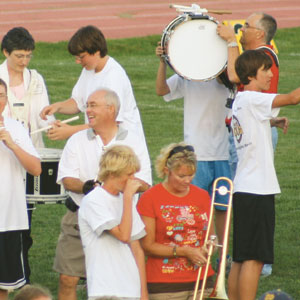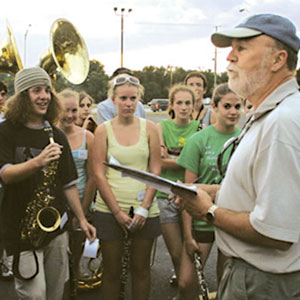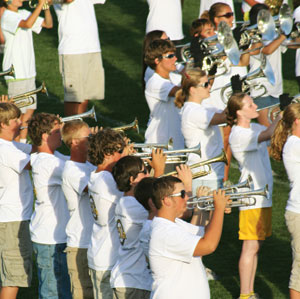.jpg) The difference between a good band and a great band begins with tone quality for me,” says Keith Rudolph, director of bands at Penn High School in Mishawaka, Indiana. “I have listened, and I have judged. Some groups that enter contests and festivals are impressive technically, but I always prefer to hear a group with a mature sound, even if the students don’t play with quite as much technique.”
The difference between a good band and a great band begins with tone quality for me,” says Keith Rudolph, director of bands at Penn High School in Mishawaka, Indiana. “I have listened, and I have judged. Some groups that enter contests and festivals are impressive technically, but I always prefer to hear a group with a mature sound, even if the students don’t play with quite as much technique.”
After 36 years on the podium at Penn, Keith is a veteran of the profession who understands how well a mature sound can contribute to producing exceptional ensembles. By example, the concert bands that are at the heart of his program regularly earn gold ratings at Indiana State School Music Association events, and his top symphonic band just performed at the 2008 Midwest Clinic. Penn’s marching bands have performed in numerous bowl parades, including the 2001 Tournament of Roses Parade, and the jazz ensembles he has directed have appeared at such events as the American Association of School Administrators Convention in San Franciso and the Central Pennsylvania Friends of Jazz Festival in Harrisburg.
Of the 3,200 students at Penn High School, about 425 participate in the instrumental music program, including 300 students in five concert bands and some 100 students in three orchestras; of those students, many also participate in the two jazz ensembles and marching band, which is held after school. The high school has three band directors and 11⁄3 orchestra directors, and the district middle schools have 3 1⁄2 band directors and 2 2⁄3 orchestra directors.
Tuning to F, B flat, and A
Keith begins rehearsals by making brief announcements as students play before the work of warming up gets underway. “I’ll give the band a cut off and ask everyone to sing concert F; we’ve practiced it long enough so students now do it without any reference. From that point, my warmup always varies. It will include tuning to F, B flat, and A; and it will include multiple scales. If I start on F, students anticipate they will play up the scale until I point down. It may be up a note up and back to F, or it may be several notes up and back down to F. My goal is to have everyone absolutely focus on my down beat and where it is going. Each student has to listen and match the ensemble. 
“For exceptional musicianship in a performance, a band has to be flexible, and that flexibility comes from the fact that the warmup is not predictable and it is not metered. If I were to beat out four beats for every note and have the band hold every note out, there would be no need for anyone to watch me; but because students don’t know when I’m going to make a change, they have to watch and they have to listen. I may start on a different group of notes and work up and down through scales, taking the do-re-mi approach, just to get everyone listening. No matter which key we start in I’ll ask, ‘Are you absolutely matching pitches?’ The tempo doesn’t have to be fast, but the adjustments have to be made with a critical ear. In all of Penn’s bands, the directors warmup with scales; we conduct them slowly for pitch, then we work them fast for technical development. Both are equally important.”
Tone Quality
Keith talks about playing with good tone quality at every rehearsal, reminding band members when they are most likely to slip, such as during sightreading or toward the end of a lengthy passage when it’s easy to run out of air. Students forget that all they have to do is breathe. “The more a director can get young musicians interested in what their instrument sounds like when it is played well, the more they will want to emulate that sound. There are so many ways to get good musicianship in front of students: invite a guest to play for the ensemble; ask local symphonies to send out quartets to perform; or have a university director work with your groups.”
Penn students are fortunate to live so close to South Bend because they can attend the many free concerts at Notre Dame University. Keith has also worked closely with Jay Gephart, director of bands at Purdue University. Several years ago the Penn band participated in a partnership with Purdue: Jay brought the marching band to Mishawaka and shared an evening with the Penn marching band, and later Keith brought his concert band to Purdue and shared a concert there.
Trombone, Then Tuba
Keith Rudolph is a product of Indiana music education. “Growing up, I had been a mediocre trombone player and switched to tuba in seventh grade. I nearly immediately liked it, and the more I liked it, the more I practiced. By my sophomore year at Boonville High School, I was active in everything musical that was possible and knew I wanted to be a band director. As an undergraduate I studied at Butler University and was fortunate to be in John Colbert’s symphonic band. Later I stayed on as a graduate assistant for my master’s, so it was quite a good experience.”
Penn High School had been in existence for only 15 years when Keith became its band director in 1973. “During those early years the school had six or seven different band directors. One teacher, about three directors before me, had done a fine job, based on recordings he left of the concert and jazz bands. After he left in August the school hired temporary replacements for a year. The next director stayed only one year so that I was the fourth band director in four years. As a result many of the students decided not to continue with band because they were fed up with the turnover.”
Rudolph’s first year was difficult. The high school had two concert bands with a combined enrollment of about 80 students, and because the previous directors would assign only the best students to the top band, the second band was small and with little talent. It created some bad feelings for anyone who didn’t make the top ensemble.
“During my first years I taught 8th and 9th grade bands in a middle school and two high school band classes. A jazz band that met entirely outside of school rehearsed after marching band season. Then in 1990 the 9th grade became a part of the high school, which went through a major renovation, and the band program took off because of the influx of students. The great bulk of the talent was in the middle school at that time thanks to some new teachers.
“When the high school expanded we added several teachers. I remember hiring someone for a 5⁄8ths position and said, ‘If you can hang on for a year with a 5⁄8ths salary, we will be able to make it a full-time position in a year.’ It worked out that way.”
Praise for Administrators
Excellent administrative support at several important points in the growth of the music department made a big difference in Keith’s accomplishments for the music program. “When I arrived at Penn the principal was outstanding, especially for someone with as little experience as I had. At one point the assistant superintendent was absolutely essential in helping me. In my third year of teaching I remember talking to Dean Speicher, a long-time superintendent, about the fact that Penn didn’t have an orchestra. I worried because each year parents who were new to the district would ask why there was no string program; they had thought this was an up-and-coming school system.
“‘Have your proposal ready,’ Dean would say, ‘but now the time is not right.’ He was adept at managing the system and initiating projects when the school could sustain them and not just start them. A few years later I received a call from Dean’s secretary with the simple message, ‘The time is right.’ Later that day I took the proposal to his office and we developed a timeline for starting an orchestra. We now have three string classes with an enrollment of over 100 students. The full orchestra includes advanced strings and wind students from the top concert band; because both ensembles rehearse at the same time, I sometimes let the orchestral winds go for half a period. They also rehearse on Monday evenings for two hours.”
Keith likes to consider everyone’s thoughts for the music program so that it represents a collection of ideas. In addition to the music faculty, he talks to students, parents, and the administration, asking for their input to the program. “We are fortunate to have a great group of parent volunteers and boosters who not only do a lot of the heavy lifting but also are an excellent sounding board for our future planning.”
For the summer marching band schedule, he tells students how many hours it will take to learn and polish a show, and the students decide how many hours a day and how many days a week they will practice. “They basically say, ‘We want a summer break that is as long as possible, but we also want to work hard and get it done.’ The staff believes that because marching band is an elective, students aren’t surprised to have to practice outside of class.
“Penn is on an alternating block schedule, so if students don’t practice outside of class, the ensembles just can’t move forward. The school calendar is 39 weeks of the year, several of which are interrupted by Thanksgiving, winter holidays, and a spring break. We see students for three class periods only 13 weeks each year. For the remaining 26 weeks, we see them twice a week or occasionally once. This means that if students don’t practice outside of school, we have a rough time making progress.
“At least 50% of the students in most of the ensembles study privately, and in the advanced groups the number gets higher. In the group that went to Midwest, everyone either studied with a private teacher or was coached by me. In the second group probably 75% of the students study privately.”
Marching Bands in Indiana
Rudolph believes that the more competitive marching bands get, the smaller the groups become because directors expect more rehearsal hours and more performances. As a result an increasing number of students realize they don’t have the time and don’t sign up. In the class A Indiana State finals of the 1980s, most bands had 230 or more students. Now if a band has 230 students on the field, it is probably the biggest band there.
Marching bands have become much more active and much more competitive in recent years. “At one point the marching band at Penn became so big that we couldn’t staff it. When we had about 300 members and I asked for more help, the response was, well maybe not everyone can be in the marching band. After a long talk with the parents, I decided to add more rehearsal hours and see what would happen to the numbers. Over the next three years the numbers dropped from 300 to about 225. We now have 210-215 in marching band every year. I’m not unhappy with it but, as I said, when you start involving more people and more hours, something has to give somewhere. Some students simply don’t want to devote 100 hours or so much of their summer to marching band, and that is fine. If they don’t participate, I hope they come back and play in one of the concert bands.”
Some Advice for New Teachers
As a new teacher, Rudolph remembers assigning music that he liked, even though it was too difficult for his students to master. “Part of the problem was that I had just left a graduate program where I was a graduate assistant and didn’t take the time to explore good high school literature. I hadn’t done the homework. It doesn’t mean a new director can’t rehearse some of the compositions he played in college, but he should be careful and not schedule them too frequently.
“Over the years I’ve learned that it is far better to master some thing, than it is to come close and accept some rough edges along the way. There is a fine balance to playing music that students sound great performing that also challenges them. You can easily go the other way and not challenge students enough; they loose some of their interest or potential practice time because they are bored.” 
For college graduates who will be teaching for the first time in September, Keith suggests they find out as much as possible about the school’s music program. “Unfortunately, the principal who interviewed you may not know the details that can make a difference in your first months at school. If possible, try to get a hold of materials right away, including past programs, any method books that may be in the music files, and music the ensemble performed the previous year.
“The guidance office may be able to put you in touch with band members who can be helpful. You should ask them what rehearsals were like, how they warmed up, and whether they played from method books. This will help you focus on the level of the materials that are going to be effective. You don’t want to duplicate a previous director’s work, but you should start at a level where students feel that they are going to fit in and the band can move forward.”
People Important to Band Directors
Over the years the people who have been most important to Keith Rudolph are the principal, the secretary, and the custodians at Penn High School. He remembers how one secretary came to his rescue when the band arrived in California to march in the Rose Parade only to find that a sousaphone player had left his instrument back in Indiana.
“I called the principal’s secretary, who I knew would be in even though it was a holiday break. When I explained my problem, she offered to walk down to the band room to find the sousaphone. She reported that it was in the case and then asked how she could help. The secretary took care of everything, and the next day – one day later – the sousaphone arrived by UPS at the hotel. That is typical of the secretaries at Penn. We’ve been so blessed with people who will do anything to help.
“There have also been any number of people who have bailed me out over the years. One of the reasons for their helpfulness is that if I messed something up, I acknowledged it right away. I wanted to be certain whoever I effected knew I was sorry and that I intended to work like crazy to never repeat the problem – mostly because I didn’t want to hear about it a second time. Since I’ve done that, when I need a custodian’s help for something that is not on the schedule, many will pretty
much drop what they are doing and help out. If you are right with people, when you need them, they will be right with you.”
Thoughts About the Midwest
Keith was extremely pleased with the way his students prepared and performed for the 2008 Midwest Clinic. The band was in Chicago during the school’s finals week, so if he had it to do over, he says it might have helped to have had the Saturday before Midwest for one more long rehearsal. “But we played so well, that I’m just going to have to live with a couple of slipped notes. I knew that this was going to be a huge highlight in my career. I stood on the side of the stage still in awe of the process, even though we had just gone through it. Shortly before the band went on I noticed that our oboe soloist, who is a wonderful musician, was just about in tears. I walked over to her and asked, ‘Are you okay?’ She said, ‘I am so scared.’ I said, ‘You know, I am too. We are going to get through this.’ She played great during at the concert.”
While it is intimidating to perform for an audience of your peers, Keith attributes the large audience turn out that day to the guest appearance of tuba soloist Patrick Sheridan, who performed Straight of Hormuz, a work composed by Sheridan and Sam Pilafian just for the Penn Symphonic Band’s Midwest appearance. “I don’t know that any high school band can turn out a great audience unless you have a national name for a number of years, and I don’t think we do. Having Pat there was a huge lift for the students because he arrived a week early and had such energy and enthusiasm that he elevated our level of performance.
“We had three rehearsals with him, and he presented several clinics that included all of our other band students. Then we performed a concert exactly one week ahead of Midwest. At Midwest we had a night-before rehearsal to go through Pat’s number again. In addition the band performed Rain by Brian Balmages, directed by Ray Cramer, who simply transformed the students on that selection. The band also got a huge kick out of playing several other numbers by composers who were in the audience.”
Directors interested in taking an ensemble to perform at the Midwest should apply and go all out. “A year ago, we thought we would put a couple of pieces together to record in January. When January arrived, the performance wasn’t good enough, so the other directors and I scheduled a concert shortly before the Midwest application deadline that we recorded and sent in.
“It was absolutely worth the effort because going through the Midwest experience has elevated the band. Students are rehearsing much more maturely, and the result is that they are doing some neat things on a daily basis. It all started with questioning how we could get our very best effort on tape sometime between January and March, when normally the peak performance of the year takes place in May. It was a challenge to rethink our work a bit.
“As to programming at first I had few favorites to consider, but the more I got into it, we ended up with almost all new literature; every single piece was something we had never before played. Even if numbers were a few years old, they were new to us. We thought that was a particularly nice part of the process. Later I heard from several people who attended our concert and were appreciative of what we programmed, so we must have selected well for them too.”
Some Final Thoughts
From his perspective Keith says that in addition to having more students studying band instruments at Penn now than 30 years ago, he has also seen concerts bands in Indiana greatly improve. “The number of really fine concert bands is pretty significant. It’s a great change. There were always some good programs, but there are so many more now.”
While having his bands in the Rose Parade and at the Midwest Clinic were rewarding career highlights, another thrill for Keith is seeing Penn students continue to succeed in music. “Just a few years ago during football season, Purdue came up to play Notre Dame, and I got to be on the sidelines with the Purdue band. I had ten former students in the Purdue band and six in Notre Dame’s. Things like that continue to make my career truly special.”





